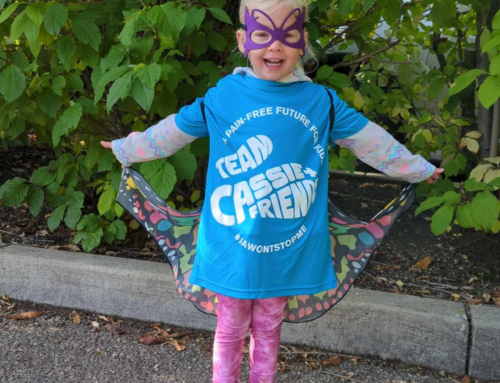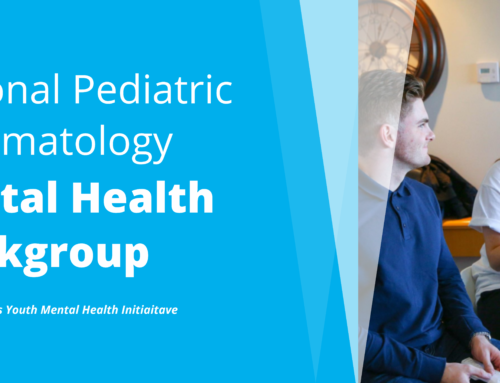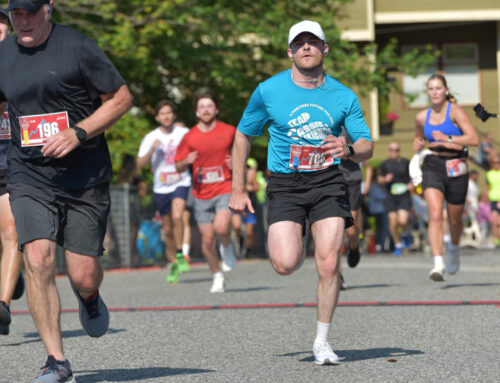Alison Legge is a member of the Cassie + Friends Youth Leader Committee. She spoke at Cassie + Friends Family Day 2016 as a youth champion, speaking about the impact chronic disease has had on her mental health. A lot has happened since then, and Alison has learned she is not alone and there is a whole community here to help.
In September 2016, my mental health took a turn for the worse. My pain was getting worse and was no longer as controlled, I was on the buprenorphine patch (Butrans) but was starting to rely on Percocet more and more. The doctors were discussing upping the dose of the patch or introducing an opiate rotation since I had been on Butrans for about two years at that point. I had just turned 21, and instead of planning my inaugural trip to Vegas like most of my friends, I was trying to figure out how I could fit these appointments into my class schedule.
My anxiety and depression were at an all-time high, and for the first time in the four years I had been dealing with chronic pain, I had lost the tiny sliver of hope that was keeping me going. The chances of a joint replacement seemed negligible, and I realized that the life I was living was probably my future. My hope of having a career, a family, and raising kids no longer seemed plausible. Sure, I would finish my degree and graduate, but there was no way I could work 40 hours a week, let alone a 9-5 job when my day revolved around my two-hour midday nap. For the first time in the four years, I felt like everything I wanted to do was so far out of reach, and I no longer knew what my purpose in life was.
As I was coming to terms with everything and as my depression got worse, I decided to do a quick scan of the OHSU oral and maxillofacial department online. I came across a surgeon who specialized in ‘reconstructive temporomandibular joint surgery,’ and all of a sudden, that tiny sliver of hope reappeared. I called the number on their website and asked if I could make an appointment. I was told they only took internal referrals and that I had to see the TMJ specialist first. The next day I saw my family doctor in Eugene who sent the referral to the TMJ specialist that day.
I saw the specialist for the first time in January, and for the first time since my jaw problems started in December of 2012, it was the first jaw-related appointment I had where I didn’t leave in tears. I saw her four times between January and May, she only saw patients on Friday’s which was not ideal with my class schedule, but I made it work driving 90 minutes each way for my 30-minute appointment. At the end of the fourth appointment, she told me there wasn’t much else she could do, and she referred me to the original surgeon I had enquired about initially.
My first appointment with the surgeon was in July of 2017, less than a year after I cold-called the hospital. Both my parents came with me for the appointment, I was a nervous wreck, I had this hope as well as this underlying fear that she would tell me there was nothing she could do, but that wasn’t the case. That appointment, she told me I was an ideal candidate for the surgery and that there shouldn’t be any issue getting insurance to cover it, I left and sobbed tears of relief. The surgery was scheduled for February 2018, and since the University of Oregon is on a quarter system rather than semesters, I would return to school in April, walk with my graduating class in June and finish the last of my classes over the summer. The plan was perfect, but I wasn’t prepared for was the anxiety I would feel leading up to the surgery.
I had dealt with anxiety growing up, and in the years dealing with chronic pain had dealt with what I would call high-functioning but quite severe depression. Neither of which prepared me for the anxiety I felt in the six months leading up to my surgery. I had such high hopes, but the fear of failure was even higher. I was continually going back and forth between being so excited at the possibility and absolutely terrified for the result because if it didn’t work, I was indeed out of options. I was giving myself emotional whiplash and was dealing with it by crying in-between pints of ice cream.
I hit rock-bottom when I sat down to take one of my 400-level computer science midterms, and it was like everything I learned and studied just left my brain. I sat in the back of the classroom with my exam, quietly crying and handed it in after 30 minutes entirely blank except for my name. Three weeks later, I forgot to show up for a final in my other 400-level CS class; thankfully, the professor was understanding and let me make it up. That 11-week term was the hardest in my four years at Oregon, but I made it through, and before I knew it, it was the day before my surgery.
On February 5, 2018, I underwent a bilateral TMJ replacement. The surgery lasted about nine hours, and my surgeon told me that the state of my TMJ joints was much worse then what was depicted in the MRIs I’d had just a few months prior. Two days later, I was discharged from the hospital, and ten days after that, I took my last dose of Percocet. In August, I took the BuTrans patch off for the last time, in November, I took my last dose of Gabapentin, and in January of 2019, I took my final dose of Cymbalta.
To say my quality of life has improved would be the understatement of MY lifetime. I went from sleeping 12-16 hours a day to being fully functioning on 7. I got a dog who I’m able to take on walks and tire out by the end of each day. I love my job, the work I’m doing and the people I get to work with, and while the thought of having a family and kids still terrifies me, now it’s for but for completely different reasons. I do still deal with anxiety regularly.
In November, I woke up with minor jaw pain and it sent me into a major tailspin. I woke up everyday TERRIFIED and I couldn’t shut my mind off, I found myself having to excuse myself from meetings because I couldn’t stop the tears from forming at the most inopportune times. It wasn’t until my CT scan results came back clear that I felt like I could breathe again, but I still thought that I had somehow failed because I had let anxiety get the best of me. Yet I know that’s not the case, anxiety didn’t win because I wouldn’t allow it.
I talked to my doctor and got a prescription for anxiety medication, I started seeing a new counsellor regularly, and I talked about it with close friends and family that I trust. I would be lying if I said I wasn’t scared of waking up one day with jaw pain again, but I also know that I have a network of people both through the arthritis community and outside of it that I can turn to and that’s what I’m choosing to focus on. Whatever obstacle life throws my way, I know I don’t have to face it alone, and I sincerely hope that every kid, teen or young adult with a rheumatic illness knows they aren’t in this alone either.
If I’ve learned anything in the past seven years, it’s that feeling angry or frustrated or sad doesn’t make me any less of a person and choosing to go on medication to deal with my anxiety and depression doesn’t make me weak. The stigma around mental health is still very much alive and well, but as we slowly chip away at it, I hope that those who are struggling know that they have a whole community here willing to help.
It’s been three and a half years since I made the call to OHSU and every day I wake up grateful that I did. More importantly, every day, I wake up glad that I didn’t give up and decided to KEEP living.










Leave A Comment